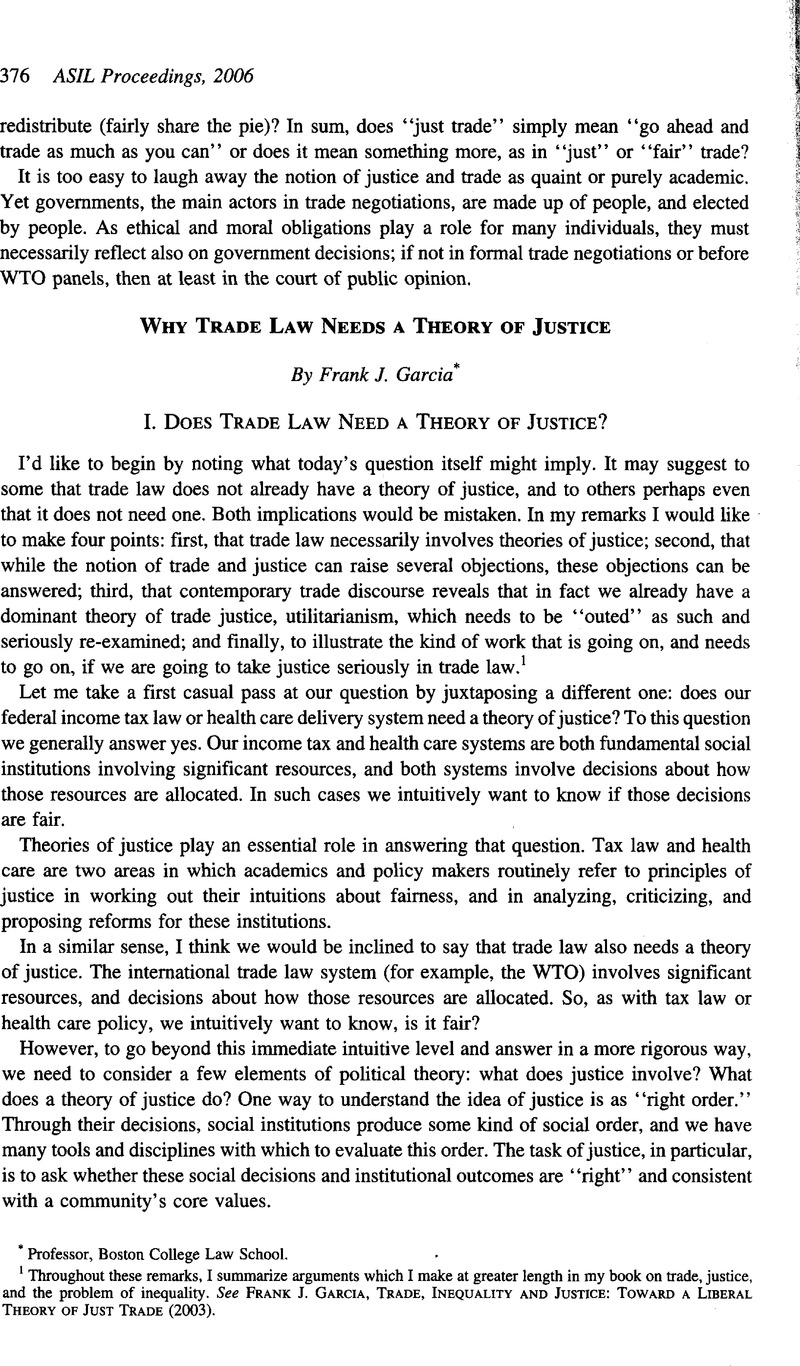No CrossRef data available.
Article contents
Why Trade Law Needs a Theory of Justice
Published online by Cambridge University Press: 28 February 2017
Abstract

- Type
- Just Trade Under Law: Do We Need a Theory of Justice for International Trade Relations?
- Information
- Copyright
- Copyright © American Society of International Law 2006
References
1 Throughout these remarks, I summarize arguments which I make at greater length in my book on trade, justice, and the problem of inequality. See Frank J. Garcia, Trade, Inequality and Justice: Toward A Liberal Theory of Just Trade (2003).
2 I am currently working on a fuller treatment of this phenomenon. A preliminary draft is available as Globalization, Global Community and the Possibility of Global Justice, Boston College Law School Legal Studies Research Paper Series No. 56 (Feb. 3, 2005), available at <http://www.ssrn.com/abstract=661564>.
3 Pauwelyn, Joost, Book Review: Just Trade (reviewing Trade, Inequality and Justice: Toward A Liberal Theory of Just Trade), 37 Geo. Wash. Int’l. L. Rev. 101 (2005)Google Scholar.
4 This is one reason why in my book, I try to suggest what just trade might involve for wealthy liberal states in particular. It has also been recently argued that the justice concepts of particularly influential states such as the U.S. have a disproportionate impact on the normative approach of multi-lateral institutions such as the WTO, Americo Beviglia Zampetti, Fairness in the World Economy (2006).
5 Garcia, Frank J., Trade, Justice and Security, in Trade As Guarantor of Peace, Liberty & Security? (Ala’i, Padideh et al., eds.) (ASIL Studies in Transnational Legal Policy, 2006)Google Scholar.
6 See Remarks by Christian Barry, infra p. 380.
7 Hillel Steiner, Exploitation Among Nations (manuscript on file with author).
8 Simon Caney, Justice Beyond Borders (2005).
9 Luis Cabrera, Political Theory of Global Justice (2004).
10 That is one way to understand the Doha agenda. See Garcia, Frank J. Beyond Special and Differential Treatment, 27 B. C. Int’l & Comp. L. Rev. 291 (2004)Google Scholar.
11 Linarelli, John, Principles of Fairness for International Economic Treaties, in Trade As Guarantor of Peace, Liberty & Security? (Ala’i, Padidah et al., eds.) (ASIL Studies in Transnational Legal Policy, 2006)Google Scholar.
12 Gathii, James, Fairness as Fidelity to Making the WTO Fully Responsive to All its Members, 97 ASIL Proc. 157 (2003)Google Scholar.
13 See Remarks by Susan Esserman, infra p. 384.
14 Supra note 3, at 112-14.
15 Pogge, Thomas, Severe Poverty as a Human Rights Violation, in Freedom From Poverty As A Human Right Who Owes What to the Very Poor (Pogge, Thomas W. ed., forthcoming)Google Scholar.
16 Petersmann, Ernst-Ulrich, Theories of Justice, Human Rights, and the Constitution of International Markets, 37 Loy. La. L. Rev. 407 (2003)Google Scholar.


